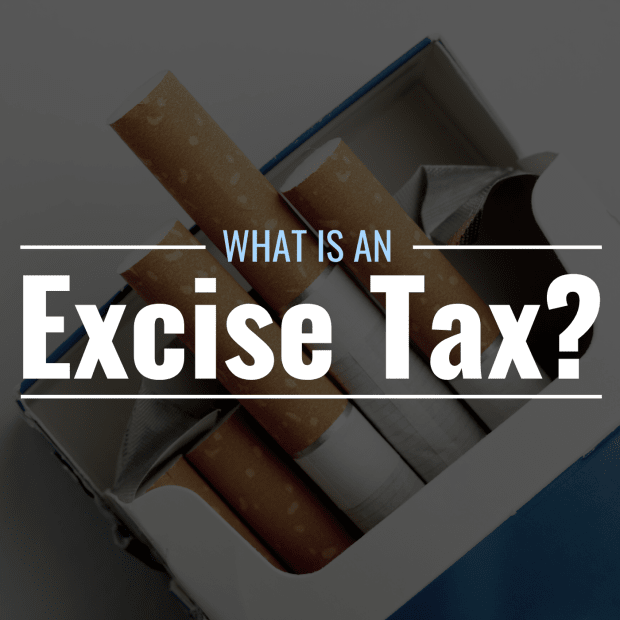
Governments, from municipal to federal, have a number of ways of getting revenue from citizens to fund their operations. The most well-known is an income tax. But there are also taxes on goods and services, as well as retail sales. Taxes on retail sales are known as sales taxes. Some taxes are included in the price of a specific products or services, such as alcohol and cigarettes. These are excise taxes.
What Is an Excise Tax?
An excise tax, unlike a sales tax, is an indirect tax. It is indirect because the manufacturer or provider of the goods or services has to charge the purchaser tax for the item, and pass the payment on to the government, unlike a direct government tax.
All levels of government—federal, state and municipal—use excise taxes as an additional means to collect taxes from consumers.
According to the Internal Revenue Service (IRS), excise taxes are taxes paid when purchases are made on a specific good, such as gasoline. The price of something subject to an excise tax often includes the tax in the price of the product. Excise taxes also are used for activities, such as on wagering or on highway usage by trucks, and on items used frequently that appear to be a good source of revenue for governments, such as motor fuel.
Types of Excise Taxes
There are two main types of excise taxes: ad valorem, and specific.
- Ad valorem is a tax levied on a fixed percentage of the value of a good or service. Property tax is a form of ad valorem tax. Ad Valorem is Latin for "according to value."
- Specific is a tax charged 'per unit sold.' As an example, think of gasoline taxes, which you pay in the price per 9/10 of a gallon, thinking you're just paying for the price of the gasoline.
Sin Tax as Excise Tax
Excise taxes are sometimes used to levy taxes on goods or services deemed by society as unnecessary or even harmful. A "sin tax" is applied to the price of things like alcohol and cigarettes, to compensate governments for the cost of dealing with the use of harmful or luxury items. Such "sin taxes" are also used to attempt to discourage the use of such products. In fact, some have proposed increasing the excise tax on gasoline to discourage its use and encourage a societal switch to alternative fuels.
Excise taxes are also charged on items such as tanning beds, ammunition, gambling, and truck highway use. And they're what you actually pay as a penalty for early withdrawals from Individual Retirement Accounts before you reach 59.5 years old.
Excise Tax Examples
The IRS actually levies a 10% tax on indoor tanning services. The tanning salon you go to charges $100 each session, adds 10% to that cost, and, it pays the IRS $10 in excise tax for each session. If it chargeds $200, it would have to pay the IRS $20. This particular form of excise tax is an ad valorem tax, and in either case, the cost of tax would likely be passed on to the consumer.
Here's another excise tax example. You want to buy a pack of cigarettes. In New York in 2023, the state's tax on each pack is $4.35—no matter what the original retail price of the pack is. Meanwhile, New York City has its own excise tax of $1.50. So the total tax of a pack of cigarettes is $5.85. That means if one pack cost $2 and another costs $4, pre-tax, the first pack will cost $7.85, while the second will cost $9.85. This is an example of a 'specific' tax—applied specifically to packs of cigarettes.
Excise Taxes on Retirement Accounts
Excess contributions to an IRA not corrected by the deadline pay a 6% excise tax. A 10% tax applies to distributions from an IRA, qualified plan or a 403(b) account if they occur before you reach 59.5 years old. If you don't withdraw the required minimum distribution by the deadline, you have to pay a 50% excise tax for "excess accumulation."
How Is an Excise Tax Different From a Sales Tax?
According to the Institute on Taxation and Economic Policy, sales taxes and excise taxes are similar in that they are both consumption taxes—that is, taxes on the consumption or use of goods and services.
Sales taxes apply to everyday items you buy, including goods (furniture and automobiles) and services (car repairs and dry cleaning). To calculate the sales tax, the item's price is multiplied by the tax rate. As an example, the sales tax rate in Michigan is 6%. So, the tax on a $30 book is $1.80. To calculate the sales tax on a taxable item, the item's cost is multiplied by the tax rate. Sales tax, like some excise taxes, is an ad valorem tax.
In theory, sales tax applies to all retail goods. But in practice, not all goods for household use are taxed. Items considered essentials, such as rent, medicine, utilities and groceries are often exempt from sales tax.
Powerful businesses often carve out exemptions for their products and, for instance, in many places, the tax base doesn't include personal services like haircuts and car repairs. States also often have more than one sales tax rate. And some states apply lower rates to items like groceries or utilities to provide low-income tax relief.
In contrast, excise taxes are sales taxes applied to particular products. Compared with other taxes, excise taxes make up a fairly small amount of state revenues, because they lack a broad base and are levied instead on only a few specific items like tobacco, alcohol, and gasoline. In part because of its narrow base, the tobacco tax in particular has become a popular source of revenue. Unlike a general sales tax, excise taxes are applied usually on a per-unit basis rather than as a percentage of the purchase price.







